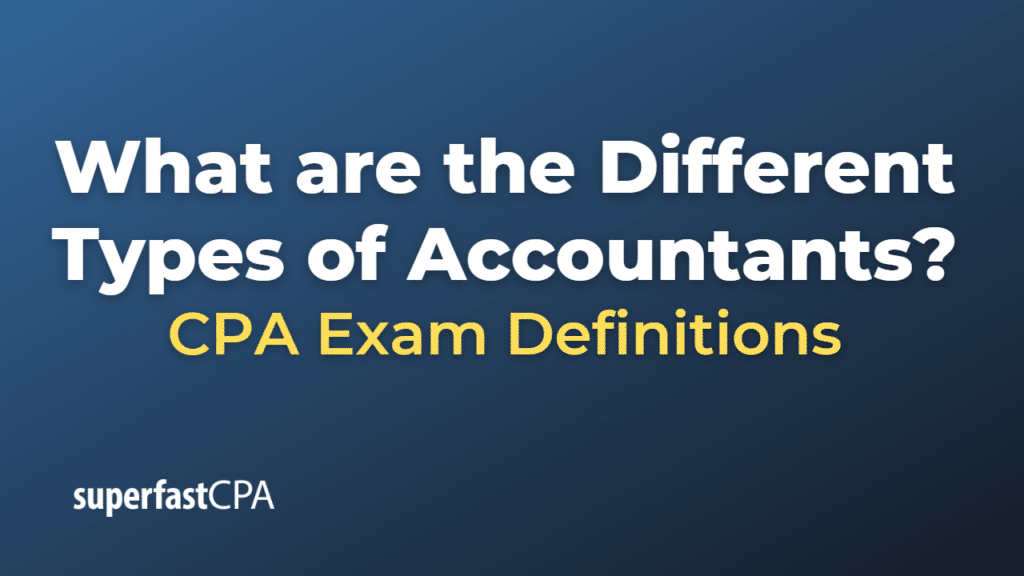Different Types of Accountants
There are several types of accountants who specialize in different areas of the field, depending on their education, certification, and the nature of their work. Here are some of the most common types:
- Certified Public Accountant (CPA): CPAs are certified by the American Institute of Certified Public Accountants (AICPA) and have passed the Uniform CPA Examination. They can work in many areas including public accounting, corporate accounting, and governmental accounting. They may provide auditing services, tax consulting, financial planning, and more.
- Management Accountant: Also known as corporate or private accountants, management accountants record and analyze financial information for the organizations for which they work. They could also be involved in budgeting, risk management, and strategic planning.
- Auditor: Auditors check financial statements and accounting ledgers to ensure that all records are accurate, complete, and in compliance with laws and regulations. They can be internal (working for the same company they’re auditing) or external (working for an independent auditing firm).
- Forensic Accountant: Forensic accountants investigate financial crimes such as fraud, embezzlement, and money laundering. They often work closely with law enforcement and testify in court cases.
- Government Accountant: Government accountants work in the public sector for governmental agencies and departments. They manage revenue and expenditure, perform audits, and ensure compliance with public sector accounting standards and regulations.
- Tax Accountant: Tax accountants specialize in preparing and filing tax returns for individuals and businesses. They stay up to date on tax laws and regulations, and provide tax planning advice to help clients minimize their tax liabilities.
- Project Accountant: Project accountants work on specific projects, tracking and documenting all financial aspects related to the project. This includes labor costs, materials expenses, and other project-related expenditures.
- Cost Accountant: Cost accountants analyze all costs associated with producing a company’s goods or services. They provide cost management information to help company executives make budgetary decisions.
- Environmental Accountant: Environmental accountants combine knowledge of accounting principles with a thorough understanding of environmental issues. They calculate the environmental costs of business activities, such as waste disposal or energy consumption.
- Nonprofit Accountant: Nonprofit accountants manage funds for nonprofit organizations, ensuring compliance with nonprofit accounting standards and government regulations. They also help these organizations manage donations and grants.
Each type of accountant plays a crucial role in their respective area, and the nature of the work they do can vary significantly. The type of accounting one chooses to pursue often depends on personal interest, career goals, and the type of work environment they prefer.
Example of the Different Types of Accountants
Here are a few examples to illustrate how these different types of accountants might function in the real world:
- Certified Public Accountant (CPA): John is a CPA who works in a public accounting firm. He is currently working on the audit of a large corporation to ensure their financial statements are accurate and comply with laws and regulations. He also provides tax advice to individuals and small businesses during tax season.
- Management Accountant: Maria is a management accountant for a large manufacturing company. She monitors the company’s expenses, prepares budget reports, and helps the management team understand the financial implications of various business decisions.
- Auditor: Robert is an auditor for an independent firm. He’s currently reviewing the financial statements of a client company, checking that all the transactions recorded over the past year are accurate and that the company has followed all the appropriate accounting procedures.
- Forensic Accountant: Lisa is a forensic accountant who works for a government agency. She’s investigating a case of suspected financial fraud in a company, tracing illicit transactions and preparing evidence to be used in court.
- Tax Accountant: Sarah is a tax accountant who helps individuals and small businesses prepare their tax returns. She also provides advice on tax planning and helps her clients understand how to comply with tax laws while minimizing their tax liabilities.
These are simplified examples, but they give an idea of how the roles of different types of accountants might look in practical scenarios. The specific duties and responsibilities can vary widely depending on the context, the complexity of the financial situation, and the specific needs of the clients or organizations they serve.













